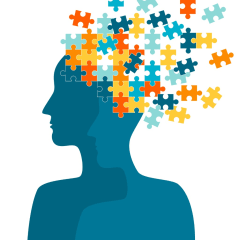Psych Therapy: A Comprehensive Guide to Techniques and End Results

Cognitive-Behavioral Therapy
Cognitive-Behavioral Therapy (CBT) is an extensively made use of psychotherapeutic method that focuses on recognizing and modifying dysfunctional reasoning and actions patterns. Developed in the 1960s by Aaron T. Beck, CBT incorporates cognitive and behavioral concepts to attend to different psychological wellness problems, consisting of clinical depression, stress and anxiety, and stress-related conditions.
CBT is defined by its organized, goal-oriented nature. Treatment usually includes a collaborative procedure in between the therapist and client, where specific troubles are recognized, and useful strategies are created to resolve them. Methods such as cognitive restructuring, exposure therapy, and skill-building exercises are frequently used. Cognitive restructuring includes challenging and changing unfavorable thought patterns, while exposure therapy intends to decrease worry and stress and anxiety via gradual exposure to been afraid objects or circumstances.
Evidence-based research study sustains the efficacy of CBT for a large range of emotional problems - Best Psychologist in Delhi. Its focus on ability acquisition and self-help strategies encourages clients to continue development individually after therapy wraps up. The flexibility and efficiency of CBT have made it a keystone in contemporary psychotherapeutic practice
Psychodynamic Approaches
Rooted in the early theories of Sigmund Freud, psychodynamic methods concentrate on exploring the subconscious mind and its impact on behavior and emotions. These techniques aim to uncover surprise ideas and feelings that may be driving maladaptive actions and emotional distress. Central to this method is the concept of inner conflict, usually originating from unresolved past experiences, specifically those from youth.
Therapists using psychodynamic techniques utilize several crucial methods, including complimentary organization, where people are encouraged to talk easily to disclose unconscious material, and dream evaluation, which interprets the unrealized content of dreams. Furthermore, the exploration of transfer and countertransference dynamics within the therapeutic connection is vital. These interactions can offer insights right into the person's internal world and relational patterns.
Psychodynamic therapy is typically longer-term contrasted to other modalities, providing a deep and detailed understanding of the person's psyche. Research study suggests that it can be particularly reliable for complicated psychological health and wellness concerns, such as character conditions and chronic clinical depression. By cultivating self-awareness and emotional insight, psychodynamic therapy looks for to bring unconscious product to consciousness, making it possible for people to achieve significant and long lasting adjustment in their lives.
Humanistic Methods
Structure on the structures laid by psychodynamic strategies, humanistic methods supply a distinctive point of view concentrated on specific possible and self-actualization. Coming from the mid-20th century, these methods prioritize the intrinsic benefits and development potential of people, highlighting a holistic sight of human experience. Trick figures such as Carl Rogers and Abraham Maslow have actually substantially affected this healing approach, which encompasses techniques like client-centered therapy and Gestalt therapy.
Client-centered treatment, established by Rogers, plays an essential function in humanistic methods. The therapist's function is even more of a facilitator than an authority, urging customers to harness their internal sources for healing.
Gestalt therapy, an additional crucial humanistic strategy, stresses existing minute recognition and the combination of mind and body. By focusing on the "present moment," customers obtain greater insight right into their existing feelings and actions. Methods such as role-playing and led visualization are usually utilized to aid clients gain a deeper understanding of themselves, ultimately bring about improved self-awareness and fulfillment.
Integrative Treatments
Integrative therapies represent a synthesis of various restorative techniques customized to satisfy the unique demands of each customer. This method acknowledges the intricacy of human psychology and the complex nature of mental wellness issues. By incorporating aspects from different colleges of psychiatric therapy-- such as cognitive-behavioral therapy (CBT), psychodynamic therapy, and humanistic methods-- integrative treatments use an even more holistic and flexible treatment standard.
Professionals of integrative treatment evaluate each client's specific requirements, signs, and individual background to devise a tailored treatment plan. This customized strategy enhances the possibility for therapeutic success by addressing the root triggers of mental distress and advertising total wellness. Techniques may include mindfulness exercises, cognitive restructuring, and psychological handling, each selected to target various aspects of the client's concerns.
Additionally, integrative therapies stress the healing relationship, watching the client-therapist bond as a critical part of effective therapy. This partnership fosters an encouraging environment where clients really feel risk-free to check out and resolve their worries. The adaptability of integrative treatments over here makes them ideal for a broad variety of problems, consisting of anxiety, anxiety, injury, and social troubles, thus enhancing their applicability and efficiency in varied professional setups.
:max_bytes(150000):strip_icc()/GettyImages-497325859-56a7975c3df78cf772976afa.jpg)
Measuring Treatment Outcomes
Examining the efficiency of psychiatric therapy is vital for both medical professionals and clients to make sure that the treatment is producing the preferred end results. To attain this, numerous methods and devices are used to measure therapy end results methodically. Standardized analysis tools, such as the Beck Clinical Depression Stock (BDI) and the Generalized Anxiousness Problem 7 (GAD-7), supply quantitative information on symptom severity and adjustments gradually.
Along with standard tools, qualitative approaches like client self-reports and professional meetings offer important understandings right into the individual experiences and perceived progress Get the facts of clients. Routinely arranged evaluations, normally at the start, axis, and end of therapy, help in tracking the trajectory of improvement or determining locations needing adjustment.
End result measurement is not limited to sign reduction; it likewise includes practical improvements in every day life, such as much better interpersonal relationships, boosted job efficiency, and improved total well-being. Modern advancements in digital wellness have presented mobile applications and on-line platforms that assist in real-time tracking and responses, even more refining the evaluation procedure.
Ultimately, a comprehensive method to gauging treatment outcomes makes sure that healing interventions work, efficient, and customized to satisfy the individual needs of clients, thereby enhancing the overall restorative experience.
Verdict
Humanistic techniques concentrate on personal development and self-actualization, while integrative treatments integrate numerous methods for customized treatment plans. Evaluating therapy end results through standardized analyses and qualitative methods ensures a comprehensive understanding of effectiveness, inevitably assisting customers toward enduring mental wellness improvements.
From the organized method of Cognitive-Behavioral Treatment (CBT) to the deep expedition of the unconscious in psychodynamic treatment, each technique brings one-of-a-kind benefits. Its emphasis on skill acquisition and self-help strategies encourages customers to proceed progress separately after treatment ends (Best Psychologist in Delhi). Secret figures next such as Carl Rogers and Abraham Maslow have considerably influenced this restorative technique, which incorporates techniques like client-centered treatment and Gestalt treatment
